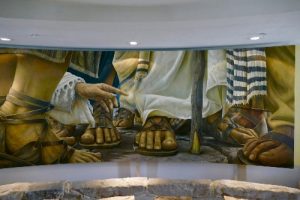HOMILY WEEK 14 01- Year II
Birthing Newness Through Faith and Covenant Love:
Optional Memorial of St. Elizabeth of Portugal
(Hos 2:14-16,19-20; Ps 145; Matt 9:18-26)
**********************************************
Have faith in Jesus; touch the hem of his garment, receive healing and participate in a new creation.
There is a relational progression in the readings today. In the first reading from Hosea, God is like a lover tenderly calling Israel to come back to her first fervor. God wants an intimate, covenantal marriage relationship with God’s people, involving righteousness, justice, steadfast love and mercy. God wants God’s people to truly know and experience God’s love.
Psalm 145 unfolds what God is truly like: kind, merciful, slow to anger, gracious, abounding in steadfast love. Our response to that love is to praise God and celebrate God’s awesome deeds.
 In the Gospel we see God incarnate, Jesus, performing two miracles. A synagogue leader’s daughter has died, and an older woman with a hemorrhage wants to touch his cloak. By touching the hem of his garment with faith, she is healed, and because of the faith of the synagogue official, the girl is raised back to life.
In the Gospel we see God incarnate, Jesus, performing two miracles. A synagogue leader’s daughter has died, and an older woman with a hemorrhage wants to touch his cloak. By touching the hem of his garment with faith, she is healed, and because of the faith of the synagogue official, the girl is raised back to life.
These two figures in the gospel are significant, appearing in all three Synoptic Gospels. Unlike Matthew, Luke is careful to point out that the girl is “about 12” and that the woman had suffered for 12 years. One is at the age of puberty while the other is barren. One died before being able to give birth; the other was unable to birth new life.
Jesus’ miracles are all revelatory – he is not a miracle worker who performs miracles for their own sake. Note that Jesus never healed appendicitis. All his miracles have a purpose. He heals the mute so they can praise God, as in the psalm. He heals the deaf so they can hear God’s word. He heals the lame so they can walk and spread God’s word. He heals the blind so they can see the beauty of God’s creation and praise God for it.
The meaning here is that Jesus is about to birth something new in the world; a new world order, a new creation, as foretold in the first reading. By putting our complete faith and trust in him, we can participate in that new creation. Just touching the hem of his garment with faith brings healing to us.
An unusual example might be youth drinking all weekend, who sneak into 5 pm mass on Sunday, and sit at the back with sunglasses on. They are touching the hem of the garment of Jesus just by being there with some degree of faith, and forgiveness and healing is happening

St Elizabeth of Portugal
The Church today honours someone who lived these teachings in an exemplary manner – St. Elizabeth of Portugal. Born in 1271, she was Daughter of King Peter III of Aragon and named after her great-aunt, St Elizabeth of Hungary. Her birth prompted a reconciliation between her father and grandfather. Thus began her reputation for bringing peace; she came to be called “the Peacemaker.” She was married at age 12 to King Denis of Portugal, by whom she had two children. She set up hospitals, orphanages and other institutions, patiently endured her husband’s infidelities, forgiving him and also providing for the education of his illegitimate children. She also acted as a peacemaker in the quarrelsome and complicated politics of the time. When her son twice led rebellions against his father, she helped them reconcile.
On her husband’s death in 1325 she retired from public life, joined the Poor Clares, giving up her rank and wealth for a life of simplicity, devoting herself to prayer and the service of the poor. Throughout her life she was faithful and regular in prayer and daily prayed the Liturgy of the Hours, way ahead of her time. She is a model of faith, forgiveness, charity, genuine caring for the poor, peacemaking, and prayer. Canonized in 1625, Elizabeth is a patron of Catholic charities.
The Eucharist is truly touching the hem of Jesus’ garment, and healing is happening to us right here and now – through Jesus’ word and sacrament. May our celebration deepen our faith in Jesus, bring us healing and new life, and empower us to share that life with others.



